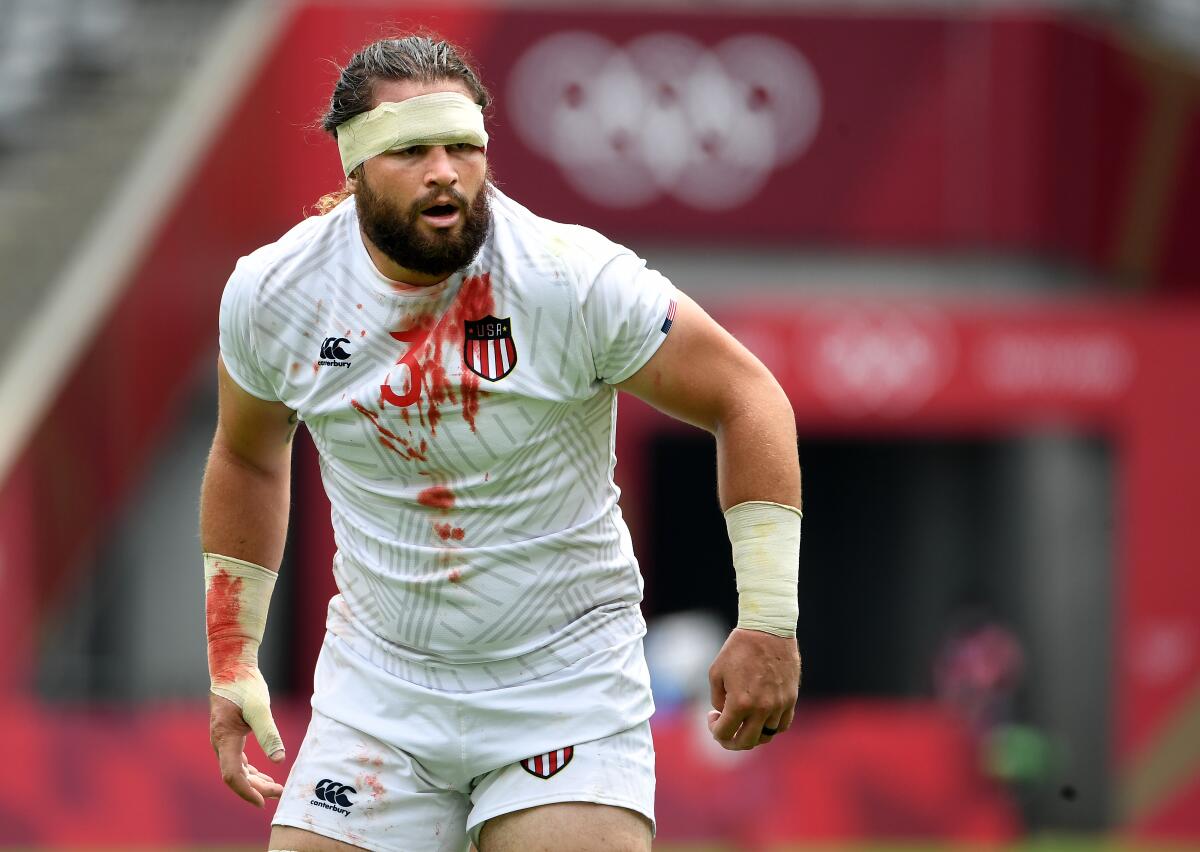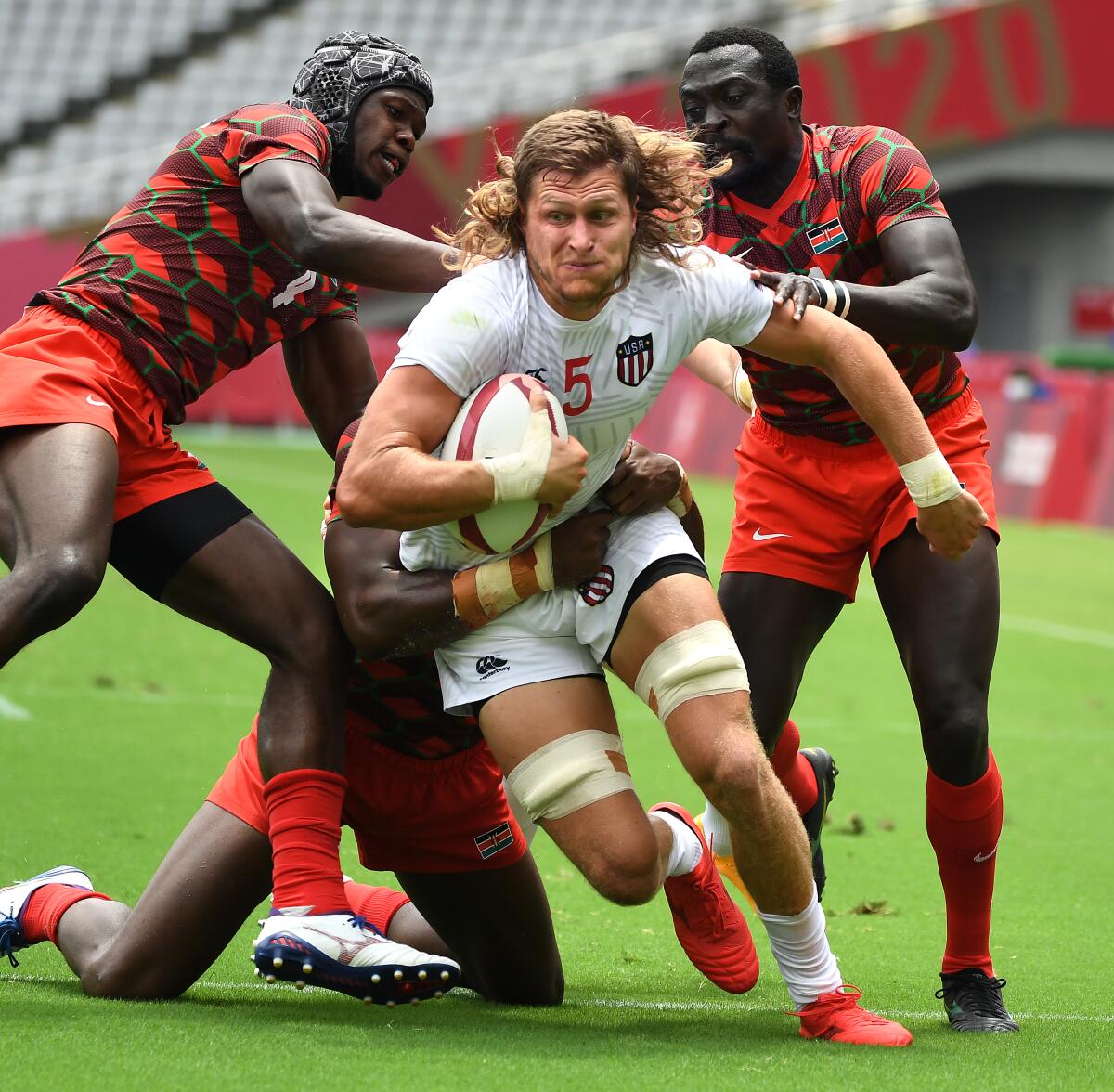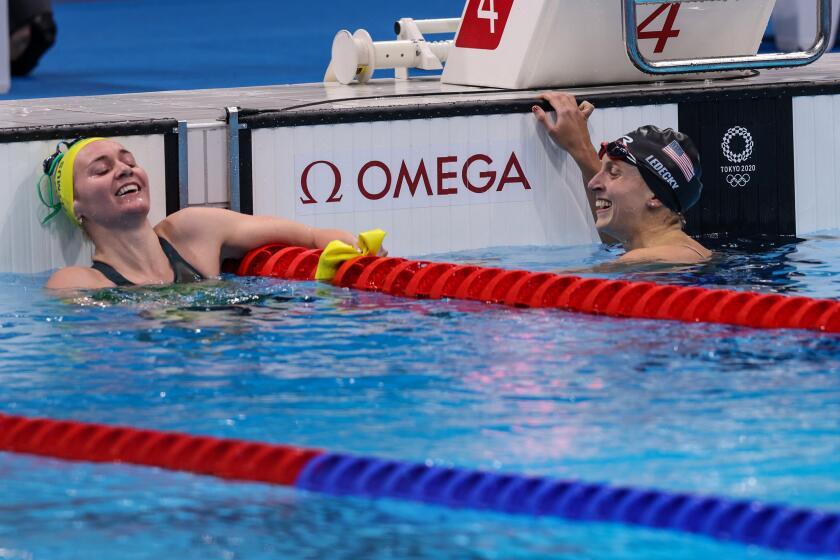U.S. rugby sevens team hopes strong Olympics will boost its domestic profile

- Share via
TOKYO — Rugby, Carlin Isles says, has taken him to some dark places.
“We go to dark places a lot, man,” he repeated Monday with a shake of his head.
Track took him to the NCAA Division II national championships. Football took him to the NFL with the Detroit Lions. Rugby has taken him to two Olympics.
And to dark places he never would have visited without it.
“There’s no sport like it,” Isles said. “You’ve got to dig deep. And it really tests you mentally. Because it’s a little voice telling you that, ‘I’m tired, I’m fatigued.’
“But you’ve got to get up and you’ve got to keep fighting.”
Katie Ledecky, the most decorated woman in swimming history, had to settle for silver after losing to Ariarne Titmus in the 400-meter freestyle.
Isles and the U.S. did just that in their opening two matches of the rugby sevens tournament Monday, rallying from a two-point deficit to beat Kenya 19-14 on Madison Hughes’ score with 29 seconds left, then holding off Ireland 19-17, to advance to the second day of pool play unbeaten and with a medal well within reach.
Although rugby is immensely popular in New Zealand, Australia, England and Japan, it’s largely unappreciated in the United States. Rugby sevens, its faster, more dynamic cousin, is even less well-known despite the fact the U.S. is an international power in the sport.
The American men were second in the world in 2019 and came to Tokyo among the favorites in the 12-team field. The U.S. women, who begin Olympic play Thursday, are even better. They also finished second in the world in 2019 but made the semifinals of the last three World Cups, winning bronze medals twice.
Despite that success, both teams remain largely anonymous at home, which is where the Olympics come in because a spot on the Tokyo medal podium and some prime-time coverage on NBC would bring the sport into a lot of living rooms where it’s never been seen before.

“This is the pinnacle,” said Chris Brown, coach of the women’s team. “Americans, as a nation, they love to compete, they love to win. And there’s nowhere better than the Olympics.
“We know that pressure. We know that there’s high expectation.”
Hughes believes if Americans give the sport a chance, they’ll embrace it.
I’m able to use my gift, which is my speed. And I like the physicality part. You really get to test your manhood, and I like that.”
— Carlin Isles on rugby
“Rugby sevens is just an absolutely incredible spectacle,” he said. “It’s so visual. The free-flowing elements where the ball’s flying around, it’s so exciting. And particularly in the Olympics, one of the best parts is that you don’t really need to understand what’s going on to enjoy it.”
That’s exactly what the International Olympic Committee was counting on when it added rugby sevens to the Games five years ago.
Traditional rugby features 15 players on a side playing two 40-minute halves. Like American football, it can be plodding and slow, and when you add in a 15-minute halftime, a typical game could last as long as two hours.
Olympic organizers wanted something quicker that would appeal to limited attention spans. But they also wanted a team sport in which subjective judging wasn’t involved. So they turned to rugby sevens, where teams are limited to seven players and halves are just seven minutes long, allowing the game to be played at a much higher speed without sacrificing the bruising collisions that define the sport.
Unable to draw energy from crowds because of COVID-19 restrictions, athletes at the Tokyo Olympics try to overcome the ‘uncomfortable’ situation.
The tournament is fast, too. Whereas soccer, which plays the same number of games, begins before the opening ceremony and concludes just before the closing ceremony, rugby sevens teams play all six of their games in three days.
It’s not just about speed, though; rugby sevens also requires players to be strong, versatile and fit enough to sprint the length of a football field for 15 minutes.
“I like the fast pace of it,” Isles said. “I like the [smaller] sides. I’m able to use my gift, which is my speed. And I like the physicality part. You really get to test your manhood, and I like that.”
If U.S. rugby had a marketable, breakout star, it would be the 31-year-old Isles. A two-time Olympian, he is widely considered the fastest player in the sport, and was the first American to score 200 international tries — a “try” in rugby is the equivalent of a touchdown in football.
A record-setting sprinter in high school, he ran a wind-aided 10.13 100 meters in 2012. After joining the Detroit Lions practice squad as a special teams player a year later, he clocked a 4.22 40-yard dash, faster than any time at the NFL combine since 1999, when electronic timing was implemented.
But his NFL career lasted just two months before he left the Lions to dedicate himself to rugby full time.
“It’s better. Way better” than football, said Isles, one of two former NFL players on the 12-man U.S. roster. “There’s a position for everybody in rugby. You don’t have to specialize in one thing.
“I play defense, I play offense, I get a lot of touches.”
Now all he needs is an Olympic medal.
“We certainly understand how the American sporting psyche works,” men’s coach Mike Friday said. “We are trying to bring the game to the American sporting public because, actually, the values of the game and the importance of the game are very much aligned to what can be good in the American sporting landscape.
“So yeah, we understand, we appreciate it. We see pressure as a privilege. And we will embrace that challenge.”
More to Read
Go beyond the scoreboard
Get the latest on L.A.'s teams in the daily Sports Report newsletter.
You may occasionally receive promotional content from the Los Angeles Times.










